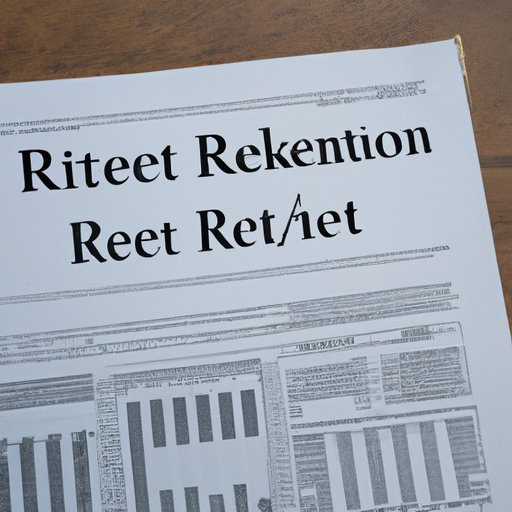Introduction
Real Estate Investment Trusts (REITs) are an increasingly popular investment option for investors looking to diversify their portfolios. REITs allow investors to invest in commercial real estate without having to buy or manage any property themselves. They offer a range of benefits, including potential tax advantages and the ability to diversify one’s investments. But are REITs a good investment right now? This article will explore the pros and cons of investing in REITs now, as well as the current market conditions for REITs.
Analyzing the Pros and Cons of Investing in REITs Now
When deciding whether or not to invest in REITs, it is important to consider both the potential benefits and drawbacks. Let’s take a look at each in more detail.
Benefits of Investing in REITs
The primary benefit of investing in REITs is that they offer a relatively low-risk way to invest in commercial real estate. REITs are professionally managed, so investors don’t have to worry about managing the properties themselves. Additionally, the dividends paid by REITs tend to be higher than those paid by stocks or bonds, making them an attractive option for income-oriented investors. Finally, REITs can provide investors with exposure to different types of real estate, such as office buildings, apartments, and shopping malls, which can help diversify their portfolios.
Drawbacks of Investing in REITs
There are also some potential drawbacks to investing in REITs. One is that they can be less liquid than other types of investments, meaning it may take longer to convert them into cash. Additionally, REITs are subject to market volatility, so investors need to be prepared for price fluctuations. Finally, REITs are typically highly leveraged, which means that if the real estate market takes a downturn, investors could potentially lose a significant amount of money.

Examining the Current Market Conditions for REITs
In order to determine whether REITs are a good investment right now, it is important to examine the current market conditions for REITs. There are several factors that can affect the performance of REITs, including interest rates, inflation, economic growth, and changes in consumer spending. Additionally, there are certain trends in the REIT market that investors should be aware of.
Factors Affecting REIT Performance
Interest rates are one of the most important factors affecting REIT performance. When interest rates are low, it makes borrowing money to finance real estate investments more affordable, thus increasing demand for REITs. Inflation can also have an impact on REITs, as it affects the value of real estate investments. Economic growth and consumer spending can also influence REIT performance, as these factors can affect the demand for commercial real estate.
Trends in the REIT Market
One trend in the REIT market is the increasing popularity of e-REITs. These are REITs that invest solely in digital assets, such as websites, software, and other online businesses. Another trend is the emergence of “green” REITs, which focus on investments in sustainable energy sources and projects. Finally, many REITs are now investing in data centers, which are becoming increasingly important in today’s digital world.
Exploring REITs as a Long-Term Investment Strategy
Investing in REITs can be a good long-term strategy, but there are both advantages and disadvantages to this approach. Let’s take a look at each in more detail.
Advantages of Investing in REITs Long-Term
One advantage of investing in REITs long-term is that it gives investors the opportunity to benefit from the compounding effect of dividend payments. Additionally, long-term investments in REITs can provide investors with greater diversity, as they can invest in different types of real estate, such as residential, industrial, and retail. Finally, long-term investments in REITs can provide investors with greater control over their investments, as they can choose when to sell or buy additional shares.
Disadvantages of Investing in REITs Long-Term
The main disadvantage of investing in REITs long-term is that it can be difficult to predict how the real estate market will perform over time. Additionally, long-term investments in REITs require investors to have a greater level of patience and discipline, as it can take years for investments to pay off. Finally, long-term investments in REITs may not be suitable for all investors, as they involve higher levels of risk.
Comparing REITs to Other Types of Real Estate Investments
It is also important to compare REITs to other types of real estate investments, such as direct ownership of property or investing in a real estate mutual fund. Let’s take a look at the benefits and risks of each.
Benefits of Investing in Other Real Estate Investments
One benefit of investing in other real estate investments is that they can provide investors with greater control over their investments. For example, investors can choose which properties to purchase, as well as when to sell them. Additionally, some real estate investments offer potential tax advantages, such as deductions for depreciation. Finally, investing in other real estate investments can provide investors with greater liquidity, as they can be converted into cash more quickly than REITs.
Risks of Investing in Other Real Estate Investments
The primary risk of investing in other real estate investments is that they require more work and knowledge than investing in REITs. Additionally, other real estate investments can be more expensive, as investors must pay closing costs and other fees associated with the purchase of property. Finally, other real estate investments are subject to market volatility, so investors need to be prepared for potential losses.

Investigating the Potential Benefits of Investing in REITs Now
Despite the risks associated with investing in REITs, there are also some potential benefits that investors should consider. Let’s take a look at two of them in more detail.
Tax Advantages of Investing in REITs
One potential benefit of investing in REITs is that they can provide investors with certain tax advantages. For example, REIT dividends are generally taxed at lower rates than ordinary income. Additionally, REITs are exempt from corporate taxes, which can help reduce overall taxes paid by investors. Finally, REITs can provide investors with deductions for depreciation, which can further reduce their tax liability.
Diversification Benefits of Investing in REITs
Another potential benefit of investing in REITs is that they can provide investors with increased diversification. By investing in different types of real estate, investors can reduce their overall portfolio risk. Additionally, REITs can provide investors with exposure to different geographic regions, which can help spread out risk even further. Finally, REITs can provide investors with exposure to different sectors, such as office buildings, apartments, and shopping malls, which can further diversify their investments.
Looking at the Risk Factors of Investing in REITs Now
Although there are potential benefits to investing in REITs now, there are also some risks that investors should be aware of. Let’s take a look at three of them in more detail.
Interest Rate Risk
One risk factor to consider when investing in REITs is interest rate risk. As mentioned previously, interest rates play an important role in determining the performance of REITs. If interest rates rise, it can make it more difficult for REITs to borrow money to finance real estate investments, which can negatively affect their performance. Additionally, rising interest rates can make it more expensive for REITs to service their debt, which can also have a negative impact on their performance.
Inflation Risk
Another risk factor to consider when investing in REITs is inflation risk. As mentioned previously, inflation can have an impact on the value of real estate investments. If inflation rises too quickly, it can erode the value of real estate investments, which can have a negative impact on REIT performance. Additionally, rising inflation can make it more difficult for REITs to service their debt, which can also have a negative impact on their performance.
Economic Risk
Finally, economic risk is another factor to consider when investing in REITs. If the economy slows down, it can have a negative impact on the demand for commercial real estate, which can lead to lower prices and lower returns for REITs. Additionally, economic slowdowns can make it more difficult for REITs to borrow money to finance real estate investments, which can also have a negative impact on their performance.

Reviewing Historical Performance of REITs
In order to get a better understanding of the potential risks and rewards of investing in REITs now, it is important to look at their historical performance. By examining past performance, investors can get a better sense of how REITs have performed in different market conditions.
Examining Past Performance of REITs
When examining the past performance of REITs, it is important to look at both the short-term and long-term performance. Generally speaking, REITs have performed fairly well over the long-term, with returns averaging around 10% annually. However, it is important to note that past performance is no guarantee of future results.
Analyzing the Impact of Market Cycles on REIT Performance
It is also important to analyze the impact of market cycles on REIT performance. Generally speaking, REITs tend to perform better during periods of economic expansion and worse during periods of economic contraction. Additionally, REITs tend to be more volatile than other types of investments, so investors need to be prepared for potential price fluctuations.
Conclusion
Overall, investing in REITs can be a good option for investors looking to diversify their portfolios. REITs offer potential tax advantages and the ability to invest in different types of real estate. Additionally, REITs can provide investors with exposure to different geographic regions and sectors. However, it is important to remember that REITs are subject to market volatility and other risks, so investors need to be prepared for potential losses. By examining the current market conditions, analyzing the pros and cons of investing in REITs now, and reviewing the historical performance of REITs, investors can make an informed decision about whether or not REITs are a good investment right now.
Summary of the Article
This article explored the risks and benefits of investing in Real Estate Investment Trusts (REITs) now. It examined current market conditions for REITs, compared them to other types of real estate investments, and looked at the potential tax advantages and diversification benefits of investing in REITs. Additionally, it reviewed the historical performance of REITs and discussed the potential risks of investing in REITs now. Finally, it provided guidance on how investors can make an informed decision about whether or not REITs are a good investment right now.
Final Thoughts on Investing in REITs Now
Investing in REITs now can be a good option for investors who are looking to diversify their portfolios and benefit from potential tax advantages. However, it is important to remember that REITs are subject to market volatility and other risks, so investors need to be prepared for potential losses. By carefully researching the current market conditions, analyzing the pros and cons of investing in REITs now, and reviewing the historical performance of REITs, investors can make an informed decision about whether or not REITs are a good investment right now.
(Note: Is this article not meeting your expectations? Do you have knowledge or insights to share? Unlock new opportunities and expand your reach by joining our authors team. Click Registration to join us and share your expertise with our readers.)
